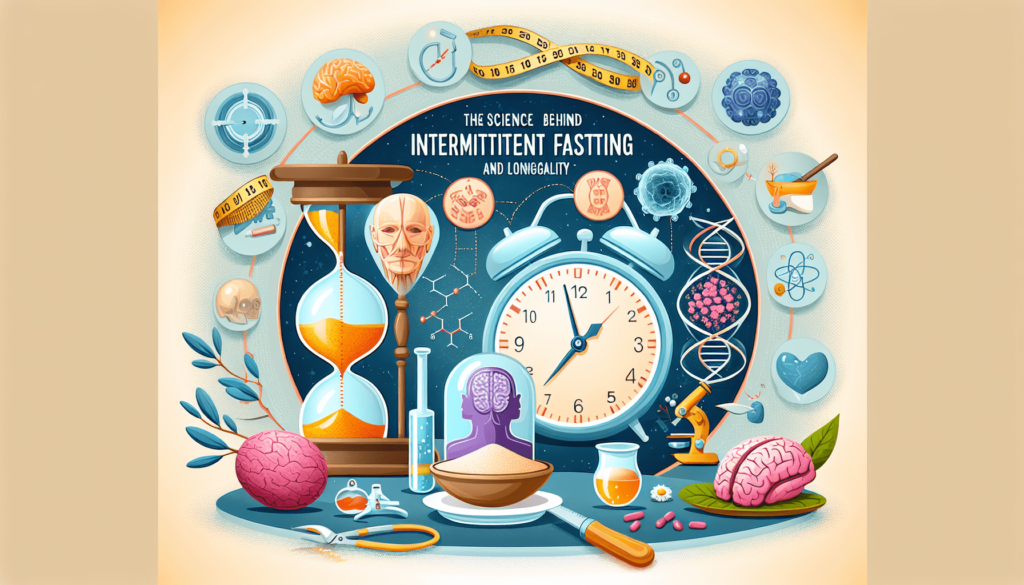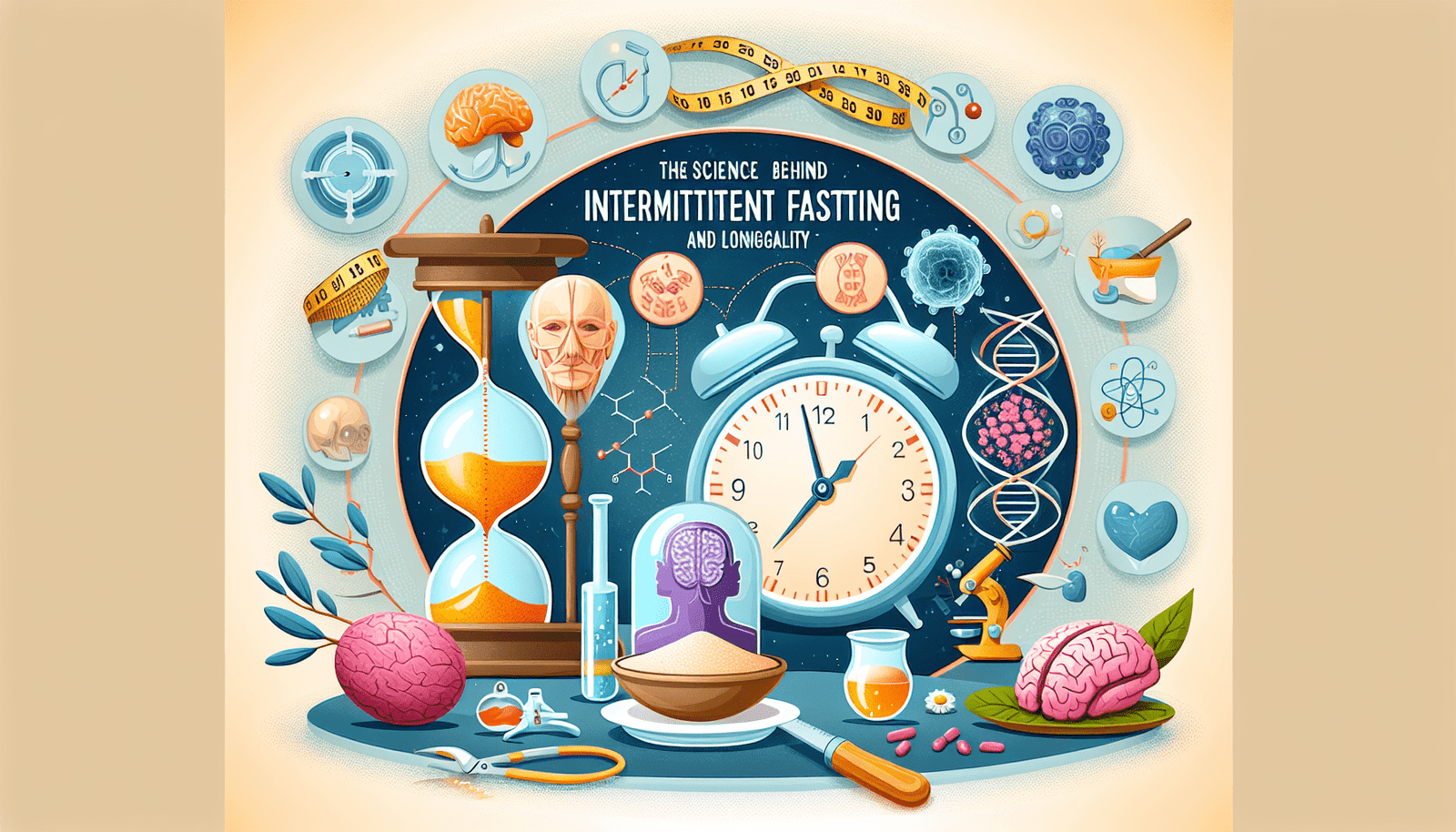Are you curious about the secret behind the age-defying benefits of intermittent fasting? Look no further! In this article, we will explore the fascinating science that underpins the connection between intermittent fasting and longevity. Prepare to be amazed by the ways in which fasting can unlock the potential for a longer and healthier life. So, grab a cup of tea and get ready to uncover the mysteries behind this incredible dietary practice.

What is Intermittent Fasting?
Definition
Intermittent fasting is a dietary pattern that involves cycling between periods of fasting and eating. It does not focus on what you eat, but rather on when you eat. There are several different types of intermittent fasting, each with its own unique approach.
Types of Intermittent Fasting
-
16/8 Method: This method involves fasting for 16 hours and restricting your eating window to 8 hours. Typically, people skip breakfast and have their first meal around noon, and then have their last meal before 8 pm.
-
5:2 Diet: With this approach, you consume normal calorie intake for five days of the week and restrict your calorie intake to 500-600 calories on the remaining two non-consecutive days.
-
Alternate-Day Fasting: As the name suggests, this method involves fasting every other day, where you eat normally on one day and then dramatically reduce your calorie intake to around 500 calories on the alternate day.
-
Eat-Stop-Eat: This method involves fasting for 24 hours, typically once or twice a week. For example, you finish eating dinner one day and then don’t eat anything until dinner the following day.
-
The Warrior Diet: This method involves fasting during the day and having one large meal at night, within a 4-hour eating window.
Each of these methods has its own benefits and suits different lifestyles. It’s important to find the one that works best for you and consult with a healthcare professional before starting any fasting regimen.
Effects of Intermittent Fasting on Aging
Reduces oxidative stress
Oxidative stress occurs when there is an imbalance between the production of free radicals and the body’s ability to neutralize them. This imbalance can contribute to aging and the development of chronic diseases. Studies have shown that intermittent fasting induces a cellular stress response that increases the production of antioxidants, reducing oxidative stress and promoting longevity.
Increases autophagy
Autophagy is the body’s natural process of clearing out damaged cells and recycling cellular components. It is an essential process for cellular health and has been linked to longevity. Intermittent fasting has been found to increase autophagy, allowing the body to eliminate damaged and dysfunctional cells more efficiently, thus improving overall cellular health and promoting longevity.
Improves insulin sensitivity
Insulin sensitivity refers to the body’s ability to efficiently process and utilize glucose from the bloodstream. Reduced insulin sensitivity is a hallmark of aging and can lead to the development of conditions such as type 2 diabetes. Intermittent fasting has been shown to improve insulin sensitivity, helping to maintain stable blood sugar levels and reducing the risk of age-related diseases.
Mechanisms of Longevity in Intermittent Fasting
Cellular stress resistance
One of the mechanisms through which intermittent fasting promotes longevity is by enhancing cellular stress resistance. When the body undergoes periods of fasting, it activates various cellular pathways that increase the resistance to stressors and improve overall cellular health. This increased resilience allows cells to better withstand the aging process and promotes longevity.
DNA repair and maintenance
DNA damage and mutations are inherent processes of aging that can lead to various age-related diseases, such as cancer. Intermittent fasting has been shown to enhance DNA repair and maintenance, reducing the accumulation of DNA damage and mutations. This helps to preserve the integrity of the genetic material and supports healthy aging.
Regulation of metabolism
Intermittent fasting has a significant impact on metabolic processes, including the regulation of metabolism. It has been shown to enhance mitochondrial function, the powerhouses of the cells responsible for energy production. By optimizing metabolic processes, intermittent fasting promotes healthy aging and increases the body’s metabolic efficiency.
Intermittent Fasting and Cellular Health
Role of cellular senescence
Cellular senescence is a state in which cells lose their ability to divide and function properly. Senescent cells can accumulate in tissues over time and contribute to aging and age-related diseases. Intermittent fasting has been found to reduce the number of senescent cells, promoting cellular health and delaying the aging process.
Impact on telomere length
Telomeres are protective caps at the ends of chromosomes, and their length is a marker of cellular aging. As cells divide, telomeres gradually shorten, and when they become too short, cells can no longer divide and become senescent. Studies have shown that intermittent fasting can help maintain telomere length, preserving cellular function and promoting longevity.
Mitochondrial function
Mitochondria play a crucial role in energy production and cellular health. Impaired mitochondrial function has been linked to aging and age-related diseases. Intermittent fasting has been shown to improve mitochondrial function, enhancing energy production and supporting overall cellular health.

Impact of Intermittent Fasting on Inflammation
Reduces chronic inflammation
Chronic inflammation is a contributor to numerous age-related diseases, including cardiovascular disease, diabetes, and neurodegenerative disorders. Intermittent fasting has been shown to reduce chronic inflammation by suppressing pro-inflammatory molecules and promoting the production of anti-inflammatory factors. This helps to maintain a healthy inflammatory balance and reduce the risk of chronic diseases.
Modulates immune response
Intermittent fasting can also modulate the immune response, promoting a more balanced and efficient immune system. It has been found to enhance the production of immune cells and increase the efficiency of their response, leading to improved immune function and a reduced risk of immune-related conditions.
Intermittent Fasting and Brain Health
Neuroprotective effects
Intermittent fasting has neuroprotective effects that can support brain health and cognitive function. Studies have shown that intermittent fasting can enhance the production of brain-derived neurotrophic factor (BDNF), a protein that promotes the growth and survival of brain cells. This can help prevent age-related cognitive decline and improve overall brain health.
Enhances cognitive function
Intermittent fasting has been linked to improved cognitive function, including enhanced memory and concentration. It has been found to increase the production of new neurons and promote synaptic plasticity, the ability of the brain to adapt and change. These effects contribute to improved cognitive performance and support healthy brain aging.
Intermittent Fasting and Metabolic Health
Weight loss and obesity management
Intermittent fasting has gained popularity as a weight loss tool due to its ability to promote calorie restriction and weight loss. By restricting the eating window and reducing overall calorie intake, intermittent fasting helps create an energy deficit, leading to weight loss. It has also been shown to be effective in reducing visceral fat, a type of fat that surrounds abdominal organs and increases the risk of metabolic disorders.
Improves lipid profile
Intermittent fasting has been found to improve lipid profile by reducing levels of total cholesterol, LDL cholesterol, and triglycerides. This can help lower the risk of cardiovascular disease and improve overall metabolic health.
Regulation of blood sugar levels
Intermittent fasting has been shown to regulate blood sugar levels by improving insulin sensitivity and reducing insulin resistance. This helps keep blood sugar levels stable and reduces the risk of developing type 2 diabetes. Intermittent fasting may also help lower fasting blood glucose levels and improve glycemic control in individuals with diabetes.
Role of Intermittent Fasting in Managing Chronic Diseases
Cardiovascular health
Intermittent fasting has been associated with various benefits for cardiovascular health. It can help lower blood pressure, reduce levels of LDL cholesterol and triglycerides, and improve markers of inflammation. These effects contribute to a reduced risk of cardiovascular diseases such as heart disease and stroke.
Type 2 diabetes
Intermittent fasting has shown promise in managing and preventing type 2 diabetes. By improving insulin sensitivity and regulating blood sugar levels, intermittent fasting can help control blood glucose levels and reduce dependence on diabetes medications. It may also contribute to weight loss, which is beneficial for diabetes management.
Cancer prevention
Animal studies have suggested a potential link between intermittent fasting and a reduced risk of cancer. Intermittent fasting has been found to suppress the growth of cancer cells and enhance the effectiveness of cancer treatments. However, further research is needed to fully understand the role of intermittent fasting in cancer prevention and treatment.
Intermittent Fasting and Exercise Performance
Effect on muscle mass
There are concerns that intermittent fasting may lead to muscle loss due to reduced calorie intake during fasting periods. However, studies have shown that intermittent fasting does not necessarily lead to muscle loss when combined with resistance exercise. In fact, it may even have a positive impact on muscle preservation and growth, especially when combined with regular strength training.
Enhances endurance
Intermittent fasting has been found to enhance endurance performance by promoting metabolic adaptations and increasing the efficiency of muscular energy utilization. It can improve fat oxidation, allowing the body to utilize fat as a fuel source more effectively during exercise. This can lead to improved endurance and performance in activities such as running, cycling, and swimming.
Conclusion
Intermittent fasting is a dietary approach that has gained significant attention in recent years due to its potential health benefits and impact on longevity. By reducing oxidative stress, increasing autophagy, improving insulin sensitivity, and regulating metabolism, intermittent fasting can promote healthy aging at the cellular level. It also has beneficial effects on inflammation, brain health, metabolic health, and may play a role in managing chronic diseases. Further research is needed to fully understand the mechanisms behind these effects and explore the potential of intermittent fasting in promoting optimal health and longevity. With its flexibility and potential positive impact, intermittent fasting is worth considering as a lifestyle approach to enhance overall well-being and promote healthy aging.

